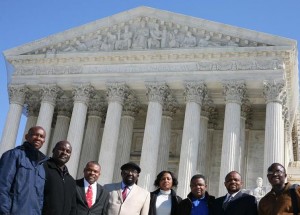
Esther Kiobel is a person.
The bright sunlight that washed the steps of the US Supreme Court on Tuesday did not compete with her radiance, the resolve of a widow, a survivor. Outside the court, her eyes searched unquestionably and steadfastly for justice.
In January 1995, when she visited her husband Barinem in a Nigerian prison to bring him some food, she was stripped, beaten and thrown into a cell herself. In November that year, Barinem was executed alongside eight other activists from the Ogoni region of Nigeria, provoking widespread international condemnation of the country’s military rulers.
To the scores of scholars, students, activists, business groups and journalists who have been monitoring, reporting, opining on the legal technicalities of the case Esther Kiobel v. Royal Dutch Shell Petroleum, “Kiobel” has become shorthand for the question of whether corporations may be held civilly liable for international human rights violations under the US Alien Tort Statute (ATS). More generally, Kiobel has become shorthand for the notion of corporate accountability.
The case has become the stuff of which law students camp out overnight on the courthouse plaza to catch a glimpse. And Tuesday morning, by 9 am, the line to get a chance for a seat to hear noted lawyers in a battle between Ms. Kiobel and the 11 other Nigerian plaintiffs and one of the world’s largest oil companies spilled out onto the Washington, DC sidewalk.

In that snakelike cue that wrapped around the imposing, pristine courthouse, four Ogoni men stood at the end, behind hundreds of overwhelmingly white young professional types. The Ogoni men had no chance of getting in. The Court must do better than to leave them behind also in its deliberations.
But it was easy to get lost in those deliberations, even for the ones fortunate enough to make it inside the packed chambers.
The ATS is a statute almost short enough to fit in a tweet. It reads, simply:
The district courts shall have original jurisdiction of any civil action by an alien for a tort only, committed in violation of the law of nations or a treaty of the United States.
Those 180 characters, though, have stirred up quite a ruckus.
The judicial throw-down Tuesday centered, for the most part, on one question: is corporate liability for violations of international law a matter of substantive international law itself, or a matter of how the US decides to provide remedies, domestically, for violations of international norms?
There is good cause for the court to conclude that the ATS is a remedial enforcement vehicle, providing jurisdiction over actions, and not dictating specific forms or classes of actors – a position supported by the US government, which weighed in in favor of the Nigerian petitioners.
The ATS is unique in its provision of a specific domestic channel for legal remedy for internationally established harms. But being unique does not make it wrong. The acts the ATS covers are the most egregious conduct known to us — torture, cruel, inhuman, or degrading treatment, genocide, war crimes, crimes against humanity and summary execution among them. They deserve special treatment. And, in fact, many states find ways to provide remedy for these wrongs. It’s what they’re supposed to do.
The statute was established in the late 1700s when assaults on ambassadors and piracy were amongst the pressing international law violations for a young new member of the community of nations to contend with. Today, the conducting, supporting, aiding, abetting, providing substantial assistance to or benefiting from extrajudicial killings, torture, and other grave acts as those alleged in Kiobel and other ATS suits at a minimum rises to the level of yesterday’s ambassadorial assault.
In an open letter to Shell published Tuesday, Nigerian, UK and US groups and individuals reminded us of the slew of attacks on the people and environment in the Niger Delta region, which they asserted that Shell has exacerbated, in part via routine payments to armed militants. The atrocities committed included the destruction of the Rumuekpe town between 2005 and 2008 and the deaths of 60 people.
During oral arguments on Tuesday, Justice Samuel Alito painted Shell and its activities in the Niger Delta as too remote for a US court to adjudicate. But, Shell is not quite so removed from the US.
Though legally anchored in the United Kingdom and the Netherlands, Shell’s US subsidiary is one of its largest, with approximately 22,000 Shell employees in the US. Including its consolidated holdings and share in equity companies, Shell is one of America’s largest oil and natural gas producers and marketers, gasoline marketers and petrochemical manufacturers. It has approximately 25,000 gas stations in the US, Shell’s most visible public presence. And it has a large base of US shareholders.
To exclude such a defendant from responsibility under the ATS would foreclose one of the few paths for redress for corporate involvement in gross violations of human rights in order to protect one of the richest corporate persons in the world.
It denies the collective power, impact and influence that a corporate entity as a whole commands by suggesting, as Shell did, that merely taking legal action against officers and directors is sufficient.
It would leave us with the absurd result Justice Breyer posed to the Shell lawyer Tuesday: Pirates, Incorporated.
“Do you think in the 18th century if they’d brought Pirates, Incorporated, and we get all their gold, and Blackbeard gets up and he says, ‘Oh, it isn’t me; it’s the corporation’….do you think that they would have then said: ‘Oh, I see, it’s a corporation. Good-bye. Go home.’?”
Esther Kiobel should not be told “Good-bye, go home”.
Take action and tell Shell to “Own Up and Pay Up to Clean Up the Niger Delta.”
Erica Razook is a member of the Business and Human Rights Group of Amnesty International USA. She is a lawyer working at the Open Society Justice Initiative.
